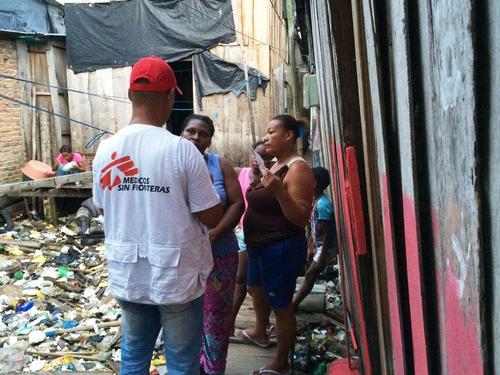We walked across a narrow bridge made of old boards corroded by time and salt water, surrounded by humble, austere houses. This is Tumaco, a city in the south-west of the Colombian department of Nariño, where the general state of abandonment is plainly seen.
People receive us with interest, wanting to know about this Chikungunya disease, whose exotic name comes from the African language Makonde – it was first detected in Tanzania in 1952 – and means ‘bent over with pain’, in reference to sufferers’ stooped appearance because of the joint pain it causes.
This little-known virus causes high fever and severe pain in joints after being bitten by an infected mosquito. In Colombia, it has already affected 208,044 people so far this year, according to the National Institutes of Health. The first cases were recorded in September last year.
The team from MSF and the Nariño Departmental Institute of Health continue their tour of this impoverished neighbourhood to raise awareness of the disease among inhabitants. They go from house to house, instructing them to cover food and drinking water and clear away items that might suffer some type of damage when they leave their houses for at least half an hour so that they can be sprayed.
In a humble abode, an elderly lady who is lying in bed, alone, distressed, looking both sad and in pain tells us that she has been suffering for a month: “Since last month I have been dragging my feet when I walk around the house, as if they were made of iron, and every day I wake up with a new and intense pain. In all this time there has not been a day when I don’t have a fever, my head doesn’t hurt or I don’t wake up with swollen hands and ankles0. I also suffer from sore shoulders, knees and neck, and itching all over my body. But what makes me panic most is the flaking I have on the soles of my feet and my elbows, as if I was a fish.” These are the symptoms of Chikungunya, which has now accumulated 930 cases in Nariño since 2014, although the number is probably much higher since most sufferers are not diagnosed, as they do not take the specific test.
Manual spraying for vector control in the most vulnerable neighbourhoods, where the houses are built on stilts over water, has been carried out in 10,000 homes, protecting about 50,000 people. In addition to the spraying, MSF has trained emergency medical personnel in several hospitals in clinical diagnosis, treatment and epidemiological reports. The MSF team has also explained to pharmacists the complications of mismanagement and the need to refer the sick to health centres.
In Colombian culture, the pharmacist plays a key role, as it is the person that patients feel close to and that they can call on because they trust them, whereas the doctor is perceived as being an unapproachable and distant figure. This situation is more pronounced in Tumaco, partly because of the difficulties in getting healthcare. In local pharmacies, people find an immediate and effective response to a large percentage of their minor ailments.
With the epidemic of Chikungunya, people have felt that the long waits in the emergency department only to return home with a dose of acetaminophen (paracetamol) do not justify the sacrifice of going through this ordeal, and they are looking for alternative pharmaceutical remedies to their severe pains. Unfortunately, in this case there is little knowledge of the disease as it is a new disease in our country for pharmacists and health workers. And also for most of the population who attribute the pains to “air pollution” or “the water,” “God punishing us,” or “the seven plagues,” among others.
This disease creates a high social impact because of the large number of cases, the sometimes long-term inability to work, the consequences of adverse effects from inappropriate medicines and the consequences of not getting an accurate diagnosis. Therefore, another element of the organisation’s response has been the donation 600 tests to help diagnose this emergent disease and help sufferers get the proper treatment.



